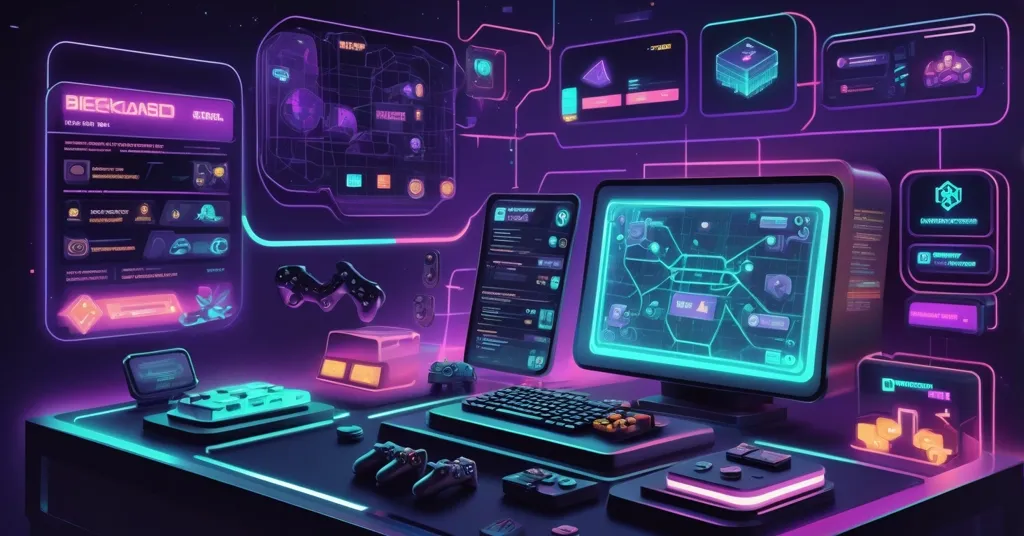Microsoft Xbox App Update: Steam, Battle.net Integration & Blockchain Gaming Potential

Microsoft Xbox App Update: Steam, Battle.net Integration, Game Pass Growth, and Blockchain Gaming Potential
Microsoft is shaking up the PC gaming scene with a freshly tested update to its Xbox app for Windows, rolled out to Xbox Insiders, aiming to become the ultimate gaming hub by weaving in heavyweights like Battle.net and possibly Steam. Beyond slick library unification and a beefed-up Game Pass, whispers of nostalgic emulation projects and untapped blockchain opportunities hint at a future where gaming and decentralized tech could collide—let’s unpack the promise and the pitfalls of this ambitious play.
- Unified Hub: Xbox app now merges games from Battle.net (and potentially Steam) into one “My Library” section.
- Game Pass Power-Up: Expanded library with EA and Ubisoft titles, pushing a subscription-first model.
- Emulation Buzz: Rumors of “Xbox Classics” to bring old-school Xbox games to modern gear by 2026.
- Blockchain Angle: Could decentralized tech redefine ownership in gaming via the Xbox app?
Xbox App Update: A Central Gaming Nexus
Microsoft’s latest move with the Xbox app for Windows, currently in testing with Xbox Insiders through the PC Gaming Preview, tackles a pain point for PC gamers: launcher overload. For the uninitiated, a launcher is essentially software you use to access, manage, and play your video games—think of it as a digital game shelf. Until now, players have had to bounce between apps like Steam, Battle.net, or Epic Games Store to launch titles from different platforms. This update changes the game by integrating supported storefronts into a single “My Library” section within the Xbox app. Battle.net, Blizzard’s platform for hits like World of Warcraft, is confirmed to sync automatically, while Steam’s inclusion remains a strong rumor but unverified for now. As Manisha Oza, Product Manager of Xbox Platform, put it:
When a player installs a game from a supported PC storefront, it will automatically appear in ‘My Library’ within the Xbox PC app.
This means no more juggling multiple apps—your recently played titles from supported platforms pop up in the app’s “Most Recent” list, ready to launch with a click. On top of that, Microsoft has tossed in user-friendly tweaks to the interface: hide pesky system apps, pin your go-to games, and clean up the clutter in your “Recently Played” list on the Xbox Home screen. It’s a clear jab at competitors, aiming to position the Xbox app as the go-to hub for PC gamers with features like Steam and Battle.net title integration. But let’s not pop the champagne yet—execution matters. If syncing glitches or platform support lags (especially with Steam unconfirmed), this could be a half-baked idea that frustrates more than it helps. We’re all for disruption, but only if it’s done right.
Game Pass Expansion: Big Numbers, Notable Gaps
Microsoft isn’t stopping at library unification; they’re doubling down on Game Pass, their subscription service often dubbed the “Netflix of gaming.” The updated app flaunts a dedicated Game Pass section, packing not just Microsoft’s own titles but also a hefty lineup from industry giants like Electronic Arts (EA) and Ubisoft. We’re talking EAFC 25 for soccer buffs and Ubisoft’s sprawling open-world epics. With 266 core titles, plus 119 from EA Play and another 124 via Ubisoft+ integration, and boasting an average review score of 77.8% per industry data, Game Pass for PC outmuscles rivals like Google Stadia’s paltry 75-game catalog for long-term subscribers or Amazon Luna’s curated but slim 82 titles.
Yet, for all its bulk, Game Pass isn’t flawless. There’s a glaring shortage of pre-last-gen classics—don’t expect a treasure trove of retro gems here—and certain genres like fighting games are thin outside EA’s offerings. This raises a red flag for gamers craving variety beyond the latest blockbusters. More broadly, Microsoft’s hard push toward subscriptions challenges the idea of owning games outright, a concept near and dear to crypto folks who value true ownership (more on that later). Sure, Game Pass is a juggernaut, positioning Microsoft as a leader in the subscription era with strategic expansions alongside EA and Ubisoft, but subscription fatigue is real. If users start feeling nickel-and-dimed or miss the permanence of buying games, this model could backfire. We’re rooting for innovation, but not at the cost of player autonomy.
Xbox Classics Emulation: Nostalgia or Pipe Dream?
Now, let’s dig into the juicy gossip stirring up the gaming crowd: an alleged “Xbox Classics” emulation project. For newcomers, emulation is tech that lets modern devices run games built for older, outdated hardware—like playing a 20-year-old title on your shiny new laptop. Social media leaks, credited to Xbox insider extas1s, claim Microsoft is crafting a platform to bring original Xbox and Xbox 360 games to current-gen consoles, PCs, handhelds like the ROG Ally, and even cloud streaming setups. The rumored kicker? A launch tied to Xbox’s 25th anniversary in 2026, complete with graphical upgrades and Game Pass integration. An unnamed source hyped it up as:
A new advanced emulation platform, designed to run classic Xbox 360 and original Xbox titles with stability, graphical improvements, and full integration across devices and the cloud.
Picture firing up Halo 2 with crisp visuals or streaming Fable on the go—that’s the fantasy. But hold your horses. There’s zero official word from Microsoft, and the Xenia team, behind an open-source Xbox 360 emulator, has explicitly denied any collaboration as reported in recent news on emulation rumors. This smells like fanboy wishful thinking. Microsoft’s past stabs at backward compatibility, like the Xbox One’s spotty catalog, show how tricky this terrain is. Legal hurdles around licensing old games, plus technical nightmares ensuring stability across diverse hardware, make this a long shot. If Microsoft pulls it off, it’s a nostalgia goldmine. If not, it’s just another overhyped tech mirage—and hell, we’ve seen plenty of those in crypto scams too. We champion accelerating tech adoption, but not with empty promises.
Blockchain in Gaming: Could Microsoft Lead the Charge?
While Microsoft hasn’t breathed a word about cryptocurrency or blockchain in relation to the Xbox app, their unification strategy begs a speculative leap—one we’re thrilled to entertain as advocates of decentralization. Blockchain tech, at its core, enables secure, transparent record-keeping, often used in crypto like Bitcoin for money or Ethereum for smart contracts. A key application relevant to gaming is NFTs (non-fungible tokens), unique digital assets tied to a blockchain that prove ownership and scarcity. Imagine buying a rare weapon or skin in a Battle.net game, having it registered as an NFT, and the Xbox app recognizing that ownership across all integrated platforms. Better yet, trade it on a decentralized marketplace without a middleman skimming profits, a concept explored in blockchain’s potential for gaming platforms.
This isn’t pure fantasy—projects like Axie Infinity and platforms like Immutable X already let players own and trade in-game assets as NFTs, disrupting the closed-off systems where companies control every purchase. Tie this to the “Xbox Classics” rumor: classic game assets or even full titles could be tokenized, preserving nostalgia while letting players monetize vintage gear securely. Microsoft could also explore decentralized identity solutions to handle cross-platform logins, addressing privacy fears (more on that below) and aligning with the freedom and control we fight for in crypto. Even cloud gaming, a Microsoft focus, could benefit from peer-to-peer streaming or tokenized bandwidth sharing, cutting reliance on centralized servers, as discussed in blockchain’s impact on gaming.
Now, the flip side. Gamers have torched NFT schemes before—look at Ubisoft’s Quartz flop, drowned in backlash over microtransactions and environmental concerns with energy-hungry blockchains like Ethereum’s old proof-of-work model. Microsoft might shy away due to regulatory murk or brand risk; big tech’s crypto forays, like Meta’s failed Diem, often crash and burn. Bitcoin itself, while king, isn’t suited for microtransactions in gaming due to fees and speed—Ethereum or layer-2 solutions like Polygon are more practical for NFTs. We’re not shilling moonshot dreams here; Microsoft shows no intent to touch this space yet. But as play-to-earn models gain steam, ignoring blockchain could leave them lagging in a future where players demand true ownership. Disruption takes guts—does Microsoft have it?
Privacy Risks: A Crypto User’s Concern
Back to the nuts and bolts of this update: integrating third-party platforms like Battle.net (and maybe Steam) into the Xbox app isn’t just a tech win—it’s a privacy minefield. Cross-platform data sharing means Microsoft could be handling your login info, play habits, and purchase history across multiple storefronts. In a world where data breaches hit harder than a lag spike, that’s a glaring vulnerability. For crypto enthusiasts who live and breathe privacy, this is a non-negotiable sticking point. How much of your info gets swapped between Microsoft and Blizzard? What’s the security protocol when a hack inevitably drops, especially with Battle.net integration specifics still unfolding?
Microsoft’s track record on data isn’t spotless—think Windows 10’s telemetry gripes—and gaming overlaps with crypto crowds who’ve been burned by centralized platforms leaking keys or wallets. A counterpoint: blockchain could offer a fix via decentralized identity, letting you control what data gets shared without trusting a corporate black box. But until Microsoft spells out ironclad policies, this integration feels like a gamble. We’re all for tech pushing boundaries, but if they fumble user trust, they’ll have a PR shitstorm on their hands—and us Bitcoin maximalists won’t hesitate to call out the nonsense, as echoed in community discussions on Battle.net merging with Xbox app. Transparency isn’t optional; it’s mandatory.
Balancing Innovation with Execution
Microsoft’s latest Xbox app push, with its unified library and Game Pass muscle, screams ambition—a bid to outpace Steam and redefine PC gaming. Toss in emulation rumors for “Xbox Classics” and a possible holiday rollout for handhelds like ROG Ally (with broader PC access eyed for late 2025 or 2026), and you’ve got a long-term vision that mirrors the effective accelerationism we back: fast-tracking tech adoption to disrupt dusty norms. Yet, unconfirmed bits like Steam’s integration and the emulation project keep us skeptical. Privacy risks loom large, and the subscription model might alienate players who crave ownership—a gap blockchain could fill if Microsoft dared to explore it.
As champions of decentralization, we’re watching with hawk eyes. Could Microsoft be the first tech titan to fuse gaming with blockchain, handing real power to players through NFTs or tokenized assets? Or will they trip on their own hype, delivering half-assed features and shaky data practices? Execution is the name of the game. We’re here for the ride, rooting for a future where innovation doesn’t mean compromise. Stay tuned as we track how this unfolds in both gaming and the wider fight for freedom in tech.
Key Takeaways and Burning Questions
- What does the Xbox app update mean for PC gamers and platform wars?
By merging Battle.net (and potentially Steam) into a single library, Microsoft positions the Xbox app as a central hub, easing launcher chaos and challenging Steam’s grip, though flawless rollout is critical for traction. - Why is Game Pass expansion a cornerstone of Microsoft’s strategy?
With 266 titles plus EA and Ubisoft additions, Game Pass solidifies a subscription-first future, outshining rivals in variety, though missing retro classics and niche genres could limit its universal pull. - What obstacles stand in the way of the rumored Xbox Classics emulation?
Legal battles over old game licensing and tech challenges ensuring compatibility across devices like PCs and handhelds loom large, especially with no official nod from Microsoft yet. - Could blockchain and NFTs reshape gaming through the Xbox app?
Decentralized tech like NFTs could enable true ownership of in-game assets or classic collectibles, fitting crypto’s push for empowerment, though Microsoft shows no sign of diving in and faces gamer skepticism. - Are privacy concerns a dealbreaker with platform unification?
Cross-platform data sharing risks leaks and misuse, demanding bulletproof security and clear policies from Microsoft to keep trust intact, especially among privacy-obsessed crypto and gaming communities.



